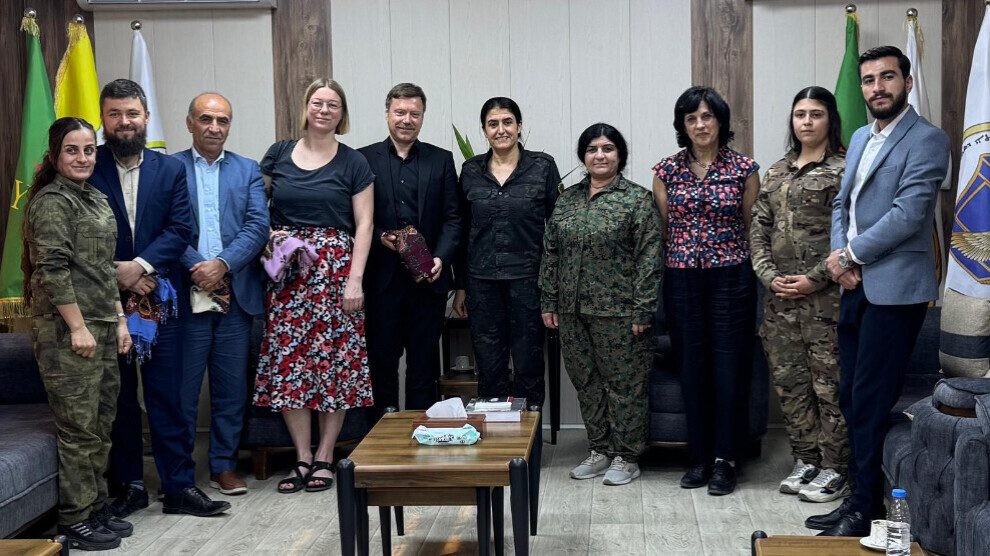EP Left Group Co-Chair meets with SDF and YPJ commanders in Rojava
EP Left Group Co-Chair Martin Schirdewan met with representatives of the North and East Syria Municipalities Organization, and commanders from the YPJ and SDF.
EP Left Group Co-Chair Martin Schirdewan met with representatives of the North and East Syria Municipalities Organization, and commanders from the YPJ and SDF.

Martin Schirdewan, Co-Chair of the European Parliament's Left Group, held important meetings on the second day of his visit to the Autonomous Administration of North and East Syria with his delegation. The delegation met with representatives of the North and East Syria Municipalities Organization in the morning and with Rohilat Efrîn, a commander of the Women's Defense Units (YPJ), and Mazlum Abdi, General Commander of the Syrian Democratic Forces (SDF), in the afternoon.
During the visit, Schirdewan was accompanied by Philip Degenhardt, Head of the International Department and Deputy Director General of the Rosa Luxemburg Center, Faik Yağızay, representative of the DEM Party at the European institutions in Strasbourg, Nora Friese-Wendenburg, Schirdewan's assistant, and Sarah Glynn.
During the morning meetings, a presentation was given by officials from the Municipalities Organization. The presentation outlined the main challenges faced by local authorities. It was stressed that Turkey's actions, including its retention of river waters, the closure of the Alouk Water Pumping Station, and the bombing of regional infrastructure, have caused significant difficulties in providing essential services such as water and electricity. Additionally, it was emphasized that Turkey has even blocked an agreement with UNICEF aimed at bringing water from the Tigris River.
Local officials, drawing attention to the threat of desertification in the region, stated that the inadequacy of infrastructure services has become even more acute, especially in meeting the needs of internal migrants. It was reported that migrants from Shehba, Manbij, Serê Kaniyê, and Girê Spî were placed in refugee camps in Hesekê, but some are still forced to live in schools five and a half years after their forced displacement.
Authorities said that this situation seriously violates the right to education of children in the region. They also noted that international aid for IDPs has significantly decreased due to the prioritization of crisis zones like Gaza and Ukraine and the withdrawal of support from organizations such as USAID.
The delegation then met with the Women's Defense Units (YPJ) Commander Rohilat Efrîn. The commander informed the delegation that the Damascus administration had delayed the prisoner exchange agreement and excluded YPJ prisoners from the process. “Still, the YPJ and SDF maintain their strength and determination. We are well-prepared and will defend our gains. We are determined to change the structure of the Syrian army,” she stated.
During the meeting with Mazlum Abdi, Commander-in-Chief of the Syrian Democratic Forces, negotiations with Damascus were discussed. Abdi stated that the Damascus government had called for the integration of the Autonomous Administration into the structure, but that they wanted to carry out this process on the basis of a “partnership.” He emphasized that Western countries should encourage the Damascus government to implement the agreement and that it was also vital for Turkey to be forced to comply with the ceasefire.
Referring to investments made for the reconstruction of the region, Mazlum Abdi highlighted the need for comprehensive foreign investment programs that are not limited to power plants, but also cover northern and eastern Syria.